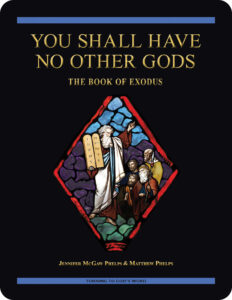 You Shall Have No Other Gods:
You Shall Have No Other Gods:
The Book of Exodus
Lesson 15 Moses Receives Wise Counsel
the book of Exodus 18:1–27
Revised Standard Version Catholic Edition (RSVCE)*
New American Bible Revised Edition (NABRE)*
Catechism of the Catholic Church
ex libris (in our library)
glossary for the book of Exodus
cross references in the book of Exodus
next lesson: God Speaks to Moses on the Mountain
This material coordinates with Lesson 15 on pages 74–77 in the study book You Shall Have No Other Gods: The Book of Exodus.
And God spoke all these words, saying, ‘I am the LORD your God, who brought you out of the land of Egypt, out of the house of bondage. You shall have no other gods before me. You shall not make for yourself a graven image, or any likeness of anything that is in heaven above, or that is in the earth beneath, or that is in the water under the earth; you shall not bow down to them or serve them; for I the LORD your God am a jealous God, visiting the iniquity of the fathers upon the children to the third and the fourth generation of those who hate me, but showing mercy to thousands of those who love me and keep my commandments.”—the book of Exodus 20:1–6
welcome to our in-depth study of the book of Exodus
We invite interested groups and individuals to check out the sample first lesson from this 28- lesson Turning to
lesson Turning to  God’s Word Catholic Bible study. These online study pages link to our free lesson video overviews, as well as to a glossary and cross references in the biblical text. Other study aids include maps, additional commentary, and prayers based on the primary Scripture in each lesson. You Shall Have No Other Gods: The Book of Exodus has been granted an imprimatur and can be purchased from our website shop. If you have a Bible-study question or comment, click on one of the “ask us your question” or “what do you think” buttons on any online study page.
God’s Word Catholic Bible study. These online study pages link to our free lesson video overviews, as well as to a glossary and cross references in the biblical text. Other study aids include maps, additional commentary, and prayers based on the primary Scripture in each lesson. You Shall Have No Other Gods: The Book of Exodus has been granted an imprimatur and can be purchased from our website shop. If you have a Bible-study question or comment, click on one of the “ask us your question” or “what do you think” buttons on any online study page.
open with prayer
It’s always wise to begin any Bible study with prayer, whether reading the Scriptures alone or meeting with others in a discussion group. You can pray using your own words or use one of the opening prayers on our website. We especially like the following:
Lord Jesus, you promised to send your Holy Spirit to teach us all things.
As we read and study your word today,
allow it to touch our hearts and change our lives. Amen.
let’s review—the book of Exodus 16:1—17:16
Lesson 14 Manna from Heaven & Water from the Rock describes the first time that the LORD fed the Israelites with manna. The manna will continue to appear throughout the people’s long journey to the Promised Land of Canaan, and then it will come to an abrupt halt. The account in the sixteenth chapter in the book of Exodus foreshadows the Christian sacrament of the Eucharist. The manna is God’s response to the murmuring of the Israelites, who are unhappy about not knowing where their next meal will come from. Despite being delivered from slavery in Egypt, the descendants of Jacob are unable to trust the LORD to provide for them in the wilderness. This section of the book of Exodus also contains important instructions from God about how the people are to gather the manna, especially on the sixth day. This underscores the importance of the sabbath or seventh day of the week as a day of rest mandated by the LORD. In the book of Exodus 16:32–34, Israelites also are commanded to place a small amount of the manna “before the covenant.” The RSVCE translates this as “before the testimony,” while the later RSV2CE reprinted in the study book renders it as “before the covenant.” Both words are referring to the ark of the covenant, which at the point in the book of Exodus being described hasn’t yet been built. That the authors of the book of Exodus include it here suggests that the book was consigned to writing perhaps quite some time after the events it describes, and that those compiling this material felt it important to include some information that doesn’t follow the apparent chronology of the work.
map notes—a brief history of Midian
The second chapter in the book of Exodus described Moses fleeing Egypt and ending up in Midian on 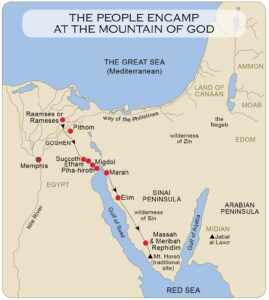 the east shore of the Gulf of Aqaba, on the northwest Arabian Peninsula. The Midianites were descendants of Abraham through Midian, a son born to the patriarch after the death of his wife Sarah. Midian’s mother was Keturah, who is described in the twenty-fifth chapter in the book of Genesis as Abraham’s wife. The same chapter notes that Abraham gave gifts to the sons of his concubines and sent them away, suggesting the patriarch considered Keturah to be a concubine. Moses’ father-in-law Jethro (also sometimes referred to as Reuel) is described as “the priest of Midian” every time he’s mentioned in the book of Exodus. Click on the map (right) to enlarge it. The original map is on page 77 in You Shall Have No Other Gods: The Book of Exodus.
the east shore of the Gulf of Aqaba, on the northwest Arabian Peninsula. The Midianites were descendants of Abraham through Midian, a son born to the patriarch after the death of his wife Sarah. Midian’s mother was Keturah, who is described in the twenty-fifth chapter in the book of Genesis as Abraham’s wife. The same chapter notes that Abraham gave gifts to the sons of his concubines and sent them away, suggesting the patriarch considered Keturah to be a concubine. Moses’ father-in-law Jethro (also sometimes referred to as Reuel) is described as “the priest of Midian” every time he’s mentioned in the book of Exodus. Click on the map (right) to enlarge it. The original map is on page 77 in You Shall Have No Other Gods: The Book of Exodus.
 a very important figure who’s frequently overlooked (56:36)
a very important figure who’s frequently overlooked (56:36)
In the eighteenth chapter in the book of Exodus, Moses’ father-in-law makes  another appearance. While he previously was referred to as both Reuel and as Jethro, in this section in the book of Exodus he’s called Jethro. What is significant about Jethro is that he’s always described as “the priest of Midian.” He’s a religious leader familiar with the religious practices of Abraham, from whom he’s descended. Jethro isn’t descended from Isaac or Jacob, however. In the biblical text for this lesson, Jethro is the first priest to offer sacrifice to the LORD. That this occurs before the LORD establishes the
another appearance. While he previously was referred to as both Reuel and as Jethro, in this section in the book of Exodus he’s called Jethro. What is significant about Jethro is that he’s always described as “the priest of Midian.” He’s a religious leader familiar with the religious practices of Abraham, from whom he’s descended. Jethro isn’t descended from Isaac or Jacob, however. In the biblical text for this lesson, Jethro is the first priest to offer sacrifice to the LORD. That this occurs before the LORD establishes the  priesthood for the Israelites is a significant point that Turning to God’s Word author Matthew Phelps discusses in some depth on the video. It’s worth noting that although the stated reason why the descendants of Jacob wanted to leave Egypt was to offer sacrifice to the LORD, there’s no evidence that they’ve done so prior to Jethro’s arrival. Jethro performs the first known sacrifice offered to the LORD when the descendants of Jacob are in the wilderness—and while he’s identified as a priest, he isn’t an Israelite priest. That has a great many interesting implications about priestly sacrifice as it develops in the Old Testament.
priesthood for the Israelites is a significant point that Turning to God’s Word author Matthew Phelps discusses in some depth on the video. It’s worth noting that although the stated reason why the descendants of Jacob wanted to leave Egypt was to offer sacrifice to the LORD, there’s no evidence that they’ve done so prior to Jethro’s arrival. Jethro performs the first known sacrifice offered to the LORD when the descendants of Jacob are in the wilderness—and while he’s identified as a priest, he isn’t an Israelite priest. That has a great many interesting implications about priestly sacrifice as it develops in the Old Testament.
The Scripture ranges for the videos that accompany this Catholic Bible study from Turning to God’s Word match the Scripture ranges for the sets of questions in You Shall Have No Other Gods: The Book of Exodus. You can follow along as Turning to God’s Word author Matthew Phelps discusses Lesson 15, “Moses Receives Wise Counsel,” on pages 74–77 in the study book.
what do those two names of Moses’ father-in-law mean?
In the biblical text for this lesson, the priest of Midian who becomes Moses’ father-in-law Jethro is called Jethro, although the book of Exodus 2:18 also  refers to him as Reuel. Scholars disagree about this biblical discrepancy, arguing one of three things: 1) Reuel and Jethro may be two forms of the same name and can be used interchangeably; 2) Reuel is head of the clan and therefore can claim to be the “father” of Jethro’s daughters; or 3) Reuel was the name of Moses’ father-in-law and Jethro was his priestly title. There’s no scholarly consensus about why both names are used. The name Jethro means “overflow,” and the name Reuel means “friend of God.” Information about the meaning of proper names used in the book of Exodus can be found in the online glossary that accompanies this Turning to God’s Word Catholic Bible study.
refers to him as Reuel. Scholars disagree about this biblical discrepancy, arguing one of three things: 1) Reuel and Jethro may be two forms of the same name and can be used interchangeably; 2) Reuel is head of the clan and therefore can claim to be the “father” of Jethro’s daughters; or 3) Reuel was the name of Moses’ father-in-law and Jethro was his priestly title. There’s no scholarly consensus about why both names are used. The name Jethro means “overflow,” and the name Reuel means “friend of God.” Information about the meaning of proper names used in the book of Exodus can be found in the online glossary that accompanies this Turning to God’s Word Catholic Bible study.
what Matthew says—Jethro is in the same business as Moses
 Moses’ father-in-law Jethro (sometimes called Reuel) is “the priest of Midian,” the religious leader of the
Moses’ father-in-law Jethro (sometimes called Reuel) is “the priest of Midian,” the religious leader of the  Midianites. It’s not a stretch to argue that Moses is the religious leader of the Israelites journeying through the wilderness after leaving Egypt. On the video overview for this lesson, Turning to God’s Word author Matthew Phelps suggests that Jethro probably has some unique insight into being the only voice of God for a whole people. He’s an ideal candidate for helping Moses quickly sort out how to manage in this new and emerging role as religious leader for all of the descendants of Jacob.
Midianites. It’s not a stretch to argue that Moses is the religious leader of the Israelites journeying through the wilderness after leaving Egypt. On the video overview for this lesson, Turning to God’s Word author Matthew Phelps suggests that Jethro probably has some unique insight into being the only voice of God for a whole people. He’s an ideal candidate for helping Moses quickly sort out how to manage in this new and emerging role as religious leader for all of the descendants of Jacob.
priests offer sacrifice, but they also mediate between God & the people
At this time in the book of Exodus, a specifically Israelite priesthood has not yet been established, so it’s significant that it’s Jethro who first offers sacrifice to the LORD. Prior to this, there is no evidence that the Israelites have made any effort to sacrifice to God, even though that was their stated reason for wanting to leave Egypt. The Passover was very deliberately something like but also unlike a sacrifice. The first sacrifice offered to the LORD in the wilderness is offered by a priest—but not one who is in the line of Isaac and Jacob. It’s significant that Aaron, who later will be anointed high priest of the Israelites and responsible for making sacrifices to the LORD, is invited to the sacrifice offered by Jethro.
Moses is a judge as well as a religious & political leader
In this section of the book of Exodus, it’s clear that Moses has begun functioning as a judge for the descendants of Jacob as well as their political and religious leader. It’s fascinating to observe the way that Moses originally combines all three roles, similar but less effective than the way that Jesus is priest, prophet, and king. As we move forward, we’ll see a separation between the roles occur when Aaron and his descendants are ordained to a hereditary priesthood. There’s probably an interesting conceptual relationship between judges and later scribes and pharisees. At the moment there’s no law, only Moses and what he says, so while Moses is acting as a judge he’s also acting as a legislator.
does Moses’ family remain with him?
Tradition holds that Moses’ sons return to Midian when Jethro leaves. This is based in part on the idea that Moses fails to have any descendants mentioned in the book of Numbers 3:1–4. Although a variety of scenarios have been proposed concerning Moses’ children, Scripture fails to provide support for any of them. What is known is that Moses’ sons didn’t inherit the priesthood with their Levitical cousins.
Moses clearly is identified as a prophet
In the book of Deuteronomy 18:15, Moses promises the Israelites: “The LORD your God will raise up for you a prophet like me from among you, from your brethren—him you shall heed … .” A major distinguishing factor of prophets is that they’re called by God individually; priests and kings, on the other hand, inherit their positions. The only qualification for being a prophet is that a person either have a strong and intimate relationship with God or be seen by God as able to develop such a relationship. The primary duty of a prophet is to speak for the LORD. Such a person would need to be able to speak with the LORD as well. Prophets are called by God to speak in specific circumstances. Priests are intended to offer sacrifice and to mediate between God and the people. It’s possible to offer sacrifices without having a relationship to God, but in order to be effective in the mediating portion of the job a person must be in close relationship with the LORD. Because so many of the Israelite priests who’ve inherited their jobs fail to relate to God, they also serve a priesthood destined for failure.
sojourn—you could look it up in our archives
 What is significant about Moses being a sojourner, a word that describes someone who is temporarily staying in a particular location that isn’t considered their true home? To learn more about how the word “sojourner” also applies to present-day Christians, read Lost in Translation, an online column in which Turning to God’s Word author Matthew Phelps helps readers connect with ideas expressed in the original languages of the Scriptures. New Lost in Translation entries are posted on Mondays, and past entries are archived on our website. Contact us if you’d like to receive Lost in Translation by email every week.
What is significant about Moses being a sojourner, a word that describes someone who is temporarily staying in a particular location that isn’t considered their true home? To learn more about how the word “sojourner” also applies to present-day Christians, read Lost in Translation, an online column in which Turning to God’s Word author Matthew Phelps helps readers connect with ideas expressed in the original languages of the Scriptures. New Lost in Translation entries are posted on Mondays, and past entries are archived on our website. Contact us if you’d like to receive Lost in Translation by email every week.
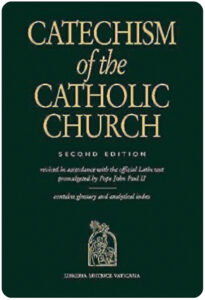 the best Catholic commentary about Scripture
the best Catholic commentary about Scripture
To find out more about how Church teaching is supported by Scripture passages in You Shall Have No Other Gods: The Book of Exodus, check out the Index of Citations in the Catechism of the Catholic Church. Links (Revised Standard Version Catholic Edition [RSVCE*]) to the primary Scripture passages in the lesson and relevant paragraphs in the Catechism are provided here. Not every passage in the biblical text for this Catholic study is referenced in a Catechism paragraph, however, including the passage in this lesson from the book of Exodus 18:1–27.
ways our glossary might prove helpful
In addition to providing extra information about geographical locations, our glossary also points out  when a person or place is mentioned in the biblical text under more than one name or more than one spelling. If you can remember a name but aren’t sure in which lesson it shows up, you can find it in the glossary, which lists every proper noun that appears in the biblical text for every lesson in You Shall Have No Other Gods: The Book of Exodus.
when a person or place is mentioned in the biblical text under more than one name or more than one spelling. If you can remember a name but aren’t sure in which lesson it shows up, you can find it in the glossary, which lists every proper noun that appears in the biblical text for every lesson in You Shall Have No Other Gods: The Book of Exodus.
to learn more, read more Scripture
If you’re having difficulty with a particular passage of Scripture, it can be helpful to read the relevant  cross references—but looking these up can take time. To make that easier, we’ve compiled the cross references from the Revised Standard Version Second Catholic Edition (RSV2CE)—the translation that we reprint in our study books. That list can be found at the top of every online study page accompanying this study, and it includes links to each of the cross references in the primary biblical text for You Shall Have No Other Gods: The Book of Exodus.
cross references—but looking these up can take time. To make that easier, we’ve compiled the cross references from the Revised Standard Version Second Catholic Edition (RSV2CE)—the translation that we reprint in our study books. That list can be found at the top of every online study page accompanying this study, and it includes links to each of the cross references in the primary biblical text for You Shall Have No Other Gods: The Book of Exodus.
don’t forget about our indexes & extra online material

 If you’re trying to locate information about a specific Scripture passage, you can look it up in the index at the back of the study book or sample lesson. If you want to find a particular commentary, you can look up its title in the topics index. To learn more about another book of the Bible for which there’s a Turning to God’s Word study, visit the online study directories to read the commentaries and watch any accompanying videos. Finally, if you have a question or would like to make a comment about any of our studies, you can use one of the “ask us your question” or “what do you think” buttons to email our authors.
If you’re trying to locate information about a specific Scripture passage, you can look it up in the index at the back of the study book or sample lesson. If you want to find a particular commentary, you can look up its title in the topics index. To learn more about another book of the Bible for which there’s a Turning to God’s Word study, visit the online study directories to read the commentaries and watch any accompanying videos. Finally, if you have a question or would like to make a comment about any of our studies, you can use one of the “ask us your question” or “what do you think” buttons to email our authors.
ex libris—Church documents & books about religious topics
Link to magisterial documents referred to in our Bible studies at ex libris—magisterial documents.  This listing includes significant recent encyclicals as well as a number of historical Church documents. Recommended books related to Scripture study can be found at ex libris—main bookshelf.
This listing includes significant recent encyclicals as well as a number of historical Church documents. Recommended books related to Scripture study can be found at ex libris—main bookshelf.
wondering how to pronounce some of these words?
The following link is to a reading from the New International Version (NIV) Bible. To listen, open the link and click on the audio icon above the printed text. Although not taken from the translations used in our study materials, the NIV reading provides an audio guide to pronunciation of words in this lesson’s primary biblical text. A close online version of the translation of the Bible used in Catholic liturgy in the United States as well as an audio guide for daily Mass readings for the current month can be found on the website of the United States Conference of Catholic Bishops (USCCB).
the book of Exodus 18:1–27 (NIV)
 close with Bible-based prayer related to this lesson
close with Bible-based prayer related to this lesson
Many of our Catholic study groups like to conclude their discussions with a prayer based on the scriptural focus of their lesson, and some participants include Scripture-specific prayer in their individual study. If you’re uncomfortable composing your own Bible-based prayers, you can follow our four easy steps. If you prefer, you can use the following short prayer based on this lesson’s text from the book of Exodus.
O God, you sent Moses’ father-in-law to advise Moses
about how to lead the Israelites with justice and mercy.
Enable us to recognize the wise counsel
you send to teach us these same things,
and allow us to respond in humility and courage
to the salvation you offer to all who follow your commandments.
We ask this in the name of Jesus Christ,
who died, and behold, is alive for evermore. Amen.
Lesson 16 God Speaks to Moses on the Mountain, the book of Exodus 19:1–25
Lesson 14 Manna from Heaven & Water from the Rock, the book of Exodus 16:1—17:16
you also may like our study of the book of Genesis
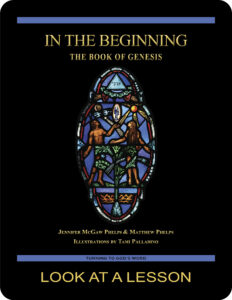 The first seven lessons of In the Beginning: The Book of Genesis, a 28-lesson Catholic Bible study with an imprimatur, provide an in-depth look at the very earliest biblical history—including the two accounts of Creation, events surrounding the Fall of Adam and Eve, the relationship between Cain and Abel, and the baptismal foreshadowing present in the account of Noah and the Flood. Remaining lessons look at lives of the patriarchs Abraham, Isaac, Jacob, and Joseph. Click on the book’s cover to view a sample lesson.
The first seven lessons of In the Beginning: The Book of Genesis, a 28-lesson Catholic Bible study with an imprimatur, provide an in-depth look at the very earliest biblical history—including the two accounts of Creation, events surrounding the Fall of Adam and Eve, the relationship between Cain and Abel, and the baptismal foreshadowing present in the account of Noah and the Flood. Remaining lessons look at lives of the patriarchs Abraham, Isaac, Jacob, and Joseph. Click on the book’s cover to view a sample lesson.
start a Turning to God’s Word Bible study
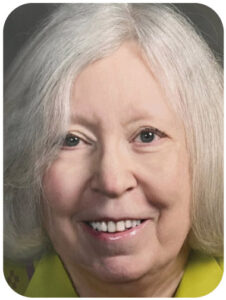 Thank you for your interest in You Shall Have No Other Gods: The Book of Exodus.
Thank you for your interest in You Shall Have No Other Gods: The Book of Exodus.  Information about beginning a Turning to God’s Word Bible study can be found at start a Bible study. Tami, Matthew, and I are available to answer your questions and to offer support. You may use this email to contact us directly if you’re interested in starting a Turning to God study or in having your study schedule listed with other TtGW study groups on our website. —Jennifer
Information about beginning a Turning to God’s Word Bible study can be found at start a Bible study. Tami, Matthew, and I are available to answer your questions and to offer support. You may use this email to contact us directly if you’re interested in starting a Turning to God study or in having your study schedule listed with other TtGW study groups on our website. —Jennifer
*There are seven deuterocanonical books in the Old Testament—the Books of Tobit, Judith, Wisdom, Sirach, Baruch, and First and Second Maccabees, as well as some passages in the Books of Esther and Daniel. Protestants usually refer to these works as “apocryphal,” a word that means “outside the (Protestant) canon” because they’re excluded from most Protestant Bibles. The word “deuterocanonical” means “second canon”; Catholics use that word to refer to any section of the Catholic Old Testament for which there are no extant, or existing, Hebrew manuscripts. All of the deuterocanonical books appear in the Septuagint, the earliest remaining versions of which date to the 1st century B.C. This Greek translation of the Old Testament was in common use by Jews at the time of Jesus—but the same books aren’t found in existing Hebrew manuscripts, which aren’t as old as the oldest version of the Septuagint. Learn more by reading How Do Catholic & Protestant Bibles Differ?
Turning to God’s Word printed Bible studies use the 2006 Revised Standard Version Second Catholic Edition (RSV2CE) translation for all Scripture references except those to the Psalms, which are taken from The Abbey Psalms and Canticles, prepared by the Benedictine monks of Conception Abbey and published in 2020 by the United States Conference of Catholic Bishops (USCCB). All Scripture links for the online study pages for You Shall Have No Other Gods: The Book of Exodus are to the 1966 Revised Standard Version Catholic Edition (RSVCE) translation. The New International Version (NIV) audio recordings follow the same chapter and verse numbering as the RSV Catholic translations, but the NIV translation doesn’t include the deuterocanonical books and passages.
The 1966 RSVCE uses archaic pronouns and verb forms such as “thee,” “thou,” “didst” in the Psalms and in direct quotations attributed to God. The 2006 RSV2CE replaces those with more accessible English. The few significant translation changes in the RSV2CE include rendering almah as “virgin” in the Book of Isaiah 7:14 and restoring the term “begotten” in the Gospel According to John 3:16.
Numbering varies for some passages in this Bible study. Turning to God’s Word studies (print and digital) follow the numbering in the Revised Standard Version Catholic translations (RSV2CE and RSVCE). Discrepancies in the New American Bible Revised Edition (NABRE) are noted in the Index of Scripture Citations in the study book and the online sample.
 You can learn more about the Psalms by viewing a sample lesson from the Turning to God’s Word Catholic Bible study Sing a New Psalm: Communicating with God Through the Prayers of the Church—Volume I: Lauds & Vespers. The second part of that study, Sing a New Psalm: Communicating with God Through the Prayers of the Church—Volume II: Vigils, Day Prayer & Compline, is scheduled for publication in 2025. Some verse numbers may vary in different translations of the Psalms.
You can learn more about the Psalms by viewing a sample lesson from the Turning to God’s Word Catholic Bible study Sing a New Psalm: Communicating with God Through the Prayers of the Church—Volume I: Lauds & Vespers. The second part of that study, Sing a New Psalm: Communicating with God Through the Prayers of the Church—Volume II: Vigils, Day Prayer & Compline, is scheduled for publication in 2025. Some verse numbers may vary in different translations of the Psalms.
